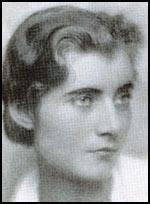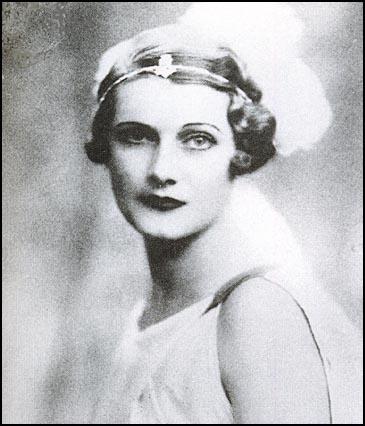Elizabeth Pack (Cynthia)

Amy Elizabeth Thorpe, the daughter of Major George Cyrus Thorpe and Cora Wells Thorpe, was born in Minneapolis on 22nd November, 1910. Her father was a professional soldier in the United States Marine Corps and in 1915 he was sent to Cuba. Elizabeth loved the hot dry sunshine and they stayed in Guantánamo all through the First World War.
After the war Major Thorpe was sent to Washington before being transferred to Hawaii. She later recalled: "I was always a loner and I never did learn how to play with other children. I had lived in too many places and adapted to too many local behaviours. I was always disoriented. I've never belonged anywhere really - or stayed anywhere long enough to be really taken in by a group."
Elizabeth was sent to the Dana Hall School in Wellesley, Massachusetts. One early admirer recalled that whenever he arrived at a party "I'd find her surrounded by a complete circle of boys - or men, as we considered ourselves. Certainly she was a beautiful girl, but the fact is she was far more reserved than most of them. She had dignity and she had no small talk - she was a serious girl really and she always held us off dancing: kept us at a distance physically, I mean. No clutching, or cheek-to-cheek... She was fully grown up at nineteen, far more adult than we were."
Marriage to Arthur Pack
At the age of twenty, she met Arthur Pack, a secretary at the British Embassy in Washington, who was nearly twice her age. "Suddenly I was having an affair with Arthur Pack. Suddenly I was engaged. I don't think for a minute he was in love with me. I know I wasn't in love with him. It was as if it was all happening and I had nothing to do with it. I went along with the events like a sleepwalker." When she discovered she was pregnant her parents insisted she married Pack.
Pack was transferred to Madrid on the eve of the Spanish Civil War. According to Bill Macdonald, the author of The True Intrepid: Sir William Stephenson and the Unknown Agents (2001): "She was in Spain during the civil war and helped a number of Franco supporters to escape. Pack began her espionage career in Poland, where she had a relationship with an aide to the Polish Foreign Secretary, Colonel Joseph Beck. Some of the information she obtained may have related to secrets of the German cipher machine ENIGMA, which the Poles were working on, and a prototype was eventually smuggled to Britain." She later confessed that "our meetings were very fruitful, and I let him make love to me as often as he wanted, since this guaranteed the smooth flow of political information I needed."
British Spy
Arthur Pack was transferred to South America. Elizabeth, writing under a pseudonym, published propaganda sympathetic to the British cause. Richard Deacon, the author of Spyclopaedia: The Comprehensive Handbook of Espionage (1987) has argued: "It was at this time she was summoned to New York and given her code name by the highly skilled spymaster, William Stephenson, head of the British Secret Service in America." William Stephenson, the head of British Security Coordination (BSC) gave her the code name "Cynthia".
H. Montgomery Hyde, a fellow BSC agent, met her for the first time in 1940: "Unusually beautiful, she had an exquisite, narrow-boned figure; a light quick-silver wit, a sharp intelligence and a soft and soothing voice that somehow inspired trust and confidence. It was by a combination of these formidable qualities that she was able to extract secrets of the highest political and military importance from the men of influence and position she cultivated for that purpose."

H. Montgomery Hyde was working at BSC at the time: "I had heard (only half believing, I must confess) of some of her more astonishing exploits in Europe, and I was aware, too, that she recently engaged in some unusually strong and subtle anti-Nazi propaganda work in South America." Marion de Chastelain worked in the BSC offices at the time and considered Cynthia to be an effective spy: "She was the type who reveled in espionage. She really loved it. And she came from a good Washington family so she had entree to all the embassies and places... She was tall... a dark blond... beautiful figure... not terribly good-looking, but she... certainly appealed to the males."
Seduction of Arthur Vandenberg
In December 1940 President Franklin D. Roosevelt made a speech where he proposed selling munitions to Britain and Canada. Isolationists like Arthur Vandenberg of Michigan and Thomas Connally of Texas argued that this legislation would lead to American involvement in the Second World War. It has been argued that both Vandenberg and Connally were targeted by British Security Coordination in order to persuade the Senate to pass the Lend-Lease proposal. Mary S. Lovell, the author of Cast No Shadow (1992) believes that Cynthia played an important role in this: "Cynthia's second mission for British Security Coordination was to try and convert the opinions of senators Connally and Vandenberg into, if not support, a less heated opposition to the Lend Lease bill which literally meant the difference between survival and defeat for the British. Other agents of both sexes were given similar missions with other politicians... with Vandenberg she was successful; with Senator Connally, chairman of the Senate Committee on Foreign Relations, she was not."
The author of The Quiet Canadian (1962) has suggested that her first major assignment was to renew a friendship with an Italian naval attaché, Alberto Lais, who was stationed at the Italian Embassy in Washington. She is said to have discovered the Italians planned to scuttle their ships harboured in the United States in March 1941. This information was passed to the American authorities.
Elizabeth Pack later recalled: "They were the happiest days of my life. They were packed with all sorts of emotions: the supreme desire to help the Allied war effort; anxiety lest I fail in the responsibilities entrusted to me; lonely despair when my moves went wrong; satisfaction when things took a constructive form. And in the end (it is with me still) the real anguish of wondering if, with more experience and better judgement, I could not have worked faster and done more."
Vichy French Government
In May 1941 Cynthia was asked to develop a relationship with someone working in the Vichy French Embassy. She eventually began an affair with Charles Brousse, the embassy's press attaché. Cynthia discovered that he was disillusioned with Pierre Laval and in July she confessed she was a BSC agent and that she was willing to pay for information. Brousse now began to obtain copies of nearly all the telegrams to and from the French Embassy. He was also able to obtain the French Naval ciphers.
Cynthia was later asked if she was ashamed of using sex to discover information from the enemy. "Ashamed? Not in the least, my superiors told me that the results of my work saved thousands of British and American lives….It involved me in situations from which respectable women draw back - but mine was total commitment. Wars are not won by respectable methods."
In 1945 Arthur Pack committed suicide. Elizabeth then married Charles Brousse and they lived in in a medieval castle in France.
Amy Elizabeth Thorpe Pack Brousse died of throat cancer on 1st December 1963. Charles Brousse was electrocuted about 10 years later by his electric blanket. Part of their castle was also destroyed in the ensuing fire.
Primary Sources
(1) Elizabeth Pack, letter to H. Montgomery Hyde (1962)
They were the happiest days of my life. They were packed with all sorts of emotions: the supreme desire to help the Allied war effort; anxiety lest I fail in the responsibilities entrusted to me; lonely despair when my moves went wrong; satisfaction when things took a constructive form. And in the end (it is with me still) the real anguish of wondering if, with more experience and better judgement, I could not have worked faster and done more.
(2) Bill Macdonald, The True Intrepid: Sir William Stephenson and the Unknown Agents (2001)
In May 1941, Cynthia was asked to concentrate on the Vichy French Embassy. Posing as a journalist, she arranged for a meeting with the Ambassador Henry-Haye. Before the interview, she met with the embassy's press attaché, Charles Brousse, and he told her of the situation in Europe. "France's future requires cooperation with Germany," he reportedly told her. "If your car is in the ditch, you turn to the person who can put it on the road again that is why we work with Germany." The two began a relationship, and after time) Brousse expressed a dislike of Laval, which Cynthia cultivated with guidance from BSC, and he talked more and more about Vichy affairs. In July of 1941, she told him she was an agent of the American government and he could receive money for information. She stressed this could help defeat Laval and the Nazis, and that he'd be a patriotic Frenchman. Eventually she obtained copies of nearly all the telegrams to and from the French Embassy and - Cynthia was instrumental in securing the French Naval ciphers.
Published reports say one night the couple heard a guard at the embassy approaching and Cynthia quickly removed all her clothes. When the guard saw her, he decided he should leave the two alone. On at least one occasion BSC is said to have used the services of a criminal, "the Georgia Cracker," a Canadian safe expert, who helped the couple procure information. By November 1942, Vichy embassy officials in the U.S. were detained in a hotel in Hershey, Pennsylvania. Cynthia tried to join the personnel by posing as Brousse's daughter. However, Brousse's wife began to put "une and une" together and Cynthia's tryst with the Vichy French came to an end....
Cynthia's exploits for Stephenson's organization are said to have greatly assisted Allied European and African operations. The Italian ciphers may have contributed to the one-sided defeat of the Italian Navy by the British in the battle of Matapan. Ellery Huntington, who headed OSS special operations for TORCH, the Invasion of Africa, was quoted as saying Cynthia's work "had changed the course of the war."
